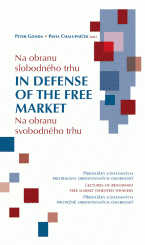 |
|||||||
| INSTITUTE | CONSERVATISM | M.R.STEFANIK |
| NEWS
|
[05.02.2007, Tom Nicholson, NEWS]
The figures come from a survey done across the Union last fall by Eurobarometer, the EU's statistics agency. The Slovak data match results from the UK, where 80 percent of respondents also rejected EU influence on taxes; the ratio was even higher in Finland, Luxemburg, Sweden and Denmark. Oµga Gyarfá¹ová from the Institute for Public Affairs in Bratislava said the protective feeling shown by Slovaks for their tax system "is a strong rejection for the [EU] notion of tax harmonization and a pat on the back for the tax reform put in place [in 2004] by [former Finance Minister] Ivan Miklo¹". While the average citizen may not understand the details of the reform, Gyarfá¹ová said, "they have grasped that the tax reform was one of the key factors in starting Slovakia's economic engines". According to the Finance Ministry, the economy should grow this year by 8.1 percent in real terms after record growth of 9.8 percent in the third quarter of 2006. If the EU's tax harmonization idea were introduced in Slovakia, it would mean higher taxes and fewer foreign investments, said Ondrej Dostál from the euro-sceptic M. R. ©tefánik Conservative Institute. "The arguments of unfair tax competition used by the backers of tax harmonization are nothing but attempts by France and Germany to slow the outflow of investments to new members of the EU," Dostál said. A proposal by the opposition Christian Democrats in October last year to have parliament declare sovereignty over direct taxation was defeated after the parties of the ruling coalition failed to support it. Ivan Kuhn, author of the Eurobarometer survey in Slovakia, said that the change in government last summer and the fears that the socialist Smer party would re-introduce graduated taxation may have led Slovaks to be more protective of the current system. The survey also showed balanced expectations regarding the future of the economy, with 30 percent expecting that the economy would worsen this year - the lowest figure since Slovakia joined the EU in 2004, and 28 percent expecting an upturn, the most in three years. Gyarfá¹ová said the Eurobarometer survey showed that the pessimism for which Slovaks are famous was beginning to lift. Article was published in the Slovakia`s English-language weekly The Slovak Spectator. |
 English | Slovak
English | Slovak
This website was created also thanks to funding granted by The Trust
for Civil Society in Central and Eastern Europe.
Website powered by Metafox CMS from Platon Group.
|
Conservative Institute of M. R. Stefanik |
Tel.:
+421 258 100 188 |

 While Slovak citizens generally support the influence of the EU on member states, some 80 percent prefer that in tax matters the Slovak government retains absolute sovereignty, while only 17 percent would give the Union a role in deciding on taxes.
While Slovak citizens generally support the influence of the EU on member states, some 80 percent prefer that in tax matters the Slovak government retains absolute sovereignty, while only 17 percent would give the Union a role in deciding on taxes.





